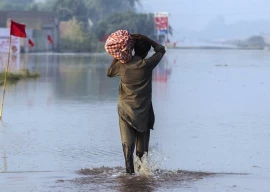
The inflation figures for the month of June are out, and there are no surprises. The official data released by Pakistan Bureau of Statistics (PBS) shows the inflation rate rising to 21.3% – highest for 13 years. The last time inflation had been recorded at slightly over 21% was in February 2009. The future prospects are not looking promising either. People will have to endure more miseries as the country struggles to deal with decades of internal economic mismanagement coupled with global recession.
One of the reasons that the inflation is breaking all previous records is the current government’s efforts to revive the IMF loan programme, without which the country could potentially face a default. One of the conditions set by the international lender was to withdraw subsidy on oil products given by the government of former Prime Minister Imran Khan just weeks before being ousted from power through a vote of no-confidence. And in just 33 days, the petrol price increased from Rs149 to Rs249 per liter. The latest hike included the imposition of the first installment of Rs10 per liter levy the government has promised to collect on petroleum production. The finance bill okayed by the National Assembly last week approved petroleum levy of Rs50 to be imposed gradually during the fiscal year 2022-23. In addition to these measures, the electricity and gas tariffs have also been jacked up.
But despite these unpopular measures, the IMF has not yet been convinced and handed another list of demands to Pakistan before the programme is revived. It means that Pakistan will not get the much-needed IMF tranche in another six weeks, throwing the market to further uncertainty. The delay in revival of the IMF programme means that Pakistan may not be able to get the financial bailout packages from friendly countries. China has re-rolled over $2 billion loan, providing much-needed respite to the fast depleting foreign reserves. But that may not be enough. Pakistan desperately needs more dollars to keep its economy afloat.
This is not the first time Pakistan faced such an economic crisis. The difference though in the past was that we did somehow manage to convince our friends to rescue us. According to renowned banker Yusaf Nazar, Pakistan had got more IMF bailout packages than any other country. This indicates that our external sector has always been vulnerable since no government, civilian or military, has ever tried to address the fundamental problems in our economy. The growth figures are often misleading. The economic survey of the last fiscal year shows Pakistan achieved 6% GDP growth despite all the challenges. There was growth in agriculture, services and large-scale manufacturing sectors. But despite those apparent positive indicators, Pakistan could not control the twin deficits related to budget and current account. The primary reason is that our growth as has often been the case is led by consumption and imports. Any growth not led by exports, investments and savings is bound to unravel.
We have now come to a stage where our friends as well as international lenders are no more listening to our same old stories. They realise we just want to live on dole-outs. The cycle of seeking financial bailout packages is also shrinking. For example, earlier if we go to our friends after 5 or 10 years, now that period has shrunk to just months. In October last year, Saudi Arabia extended a $4.2 billion package to the then PTI government. In a space of a few months, we exhausted those funds and are now looking for more help from Saudi Arabia and other countries. This recipe will not work anymore. Pakistan has to change its approach and that too quickly. Else the situation will only get worse!
Published in The Express Tribune, July 4th, 2022.
Like Opinion & Editorial on Facebook, follow @ETOpEd on Twitter to receive all updates on all our daily pieces.




1725967717-0/Untitled-design-(3)1725967717-0-165x106.webp)









COMMENTS (5)
Comments are moderated and generally will be posted if they are on-topic and not abusive.
For more information, please see our Comments FAQ